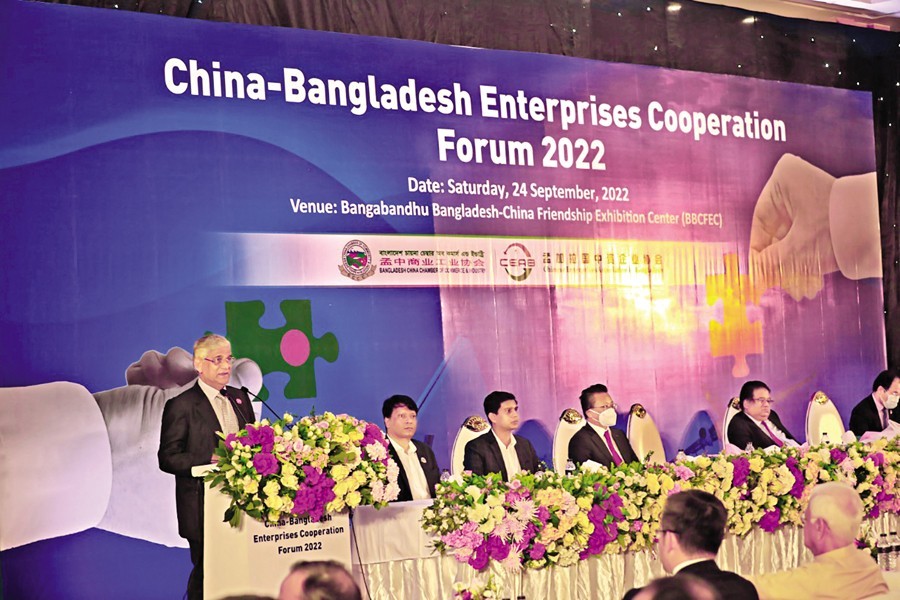Speakers at a business networking event said Bangladesh needs more Chinese market-oriented investment in the country to boost its exports in the market of China.
They said bilateral financial and currency cooperation is strongly recommended to help facilitate trade and economic cooperation.
The speakers also said China can help Bangladesh resolve many geopolitical issues.
They came up with the remarks at the "China-Bangladesh Enterprises Cooperation Forum 2022," at Bangabandhu Bangladesh-China Friendship Exhibition Center (BBCFEC) at Purbachal in the capital.
State Minister of Planning Dr. Shamsul Alam joined as the chief guest at the event, jointly organised by the Bangladesh China Chamber of Commerce & Industry (BCCCI) and the Chinese Enterprises Association in Bangladesh (CEAB).
In his address, Dr. Alam said China needs to enhance the relationship on some areas including trade visits, cultural visits, people to people relations and many more.
"There are rooms for accelerating relationship on renewable energy, technology and educational scholarships," he said.
Mentioning that Bangladesh has to follow the growth of China, Dr Alam sought technological support from the country to expand Bangladesh's economy.
Noting that Dhaka is enjoying duty-free access of 99 per cent of products in the Chinese market, he, however, emphasised on forming a comprehensive economic partnership between the two countries and signing the FTA.
He also said Bangladesh wants influx of more FDI from China.
"We built dedicated economic zone for Chinese investors," he said adding Beijing can help Bangladesh in resolving many geopolitical issues.
Chinese Ambassador in Dhaka Li Jiming and immediate past Bangladesh ambassador to China Mahbub Uz Zaman were present as special guests at the event, chaired by BCCCI President Gazi Golum Murtoza.
CEAB President Ke Changlian and BCCCI Acting General Secretary Al Mamun Mridha delivered the welcome speeches.
In his speech, Mr Li Jiming said that China-Bangladesh bilateral relationship is strong, complementary and growing.
"Our economic and political ties are vast and robust," he noted.
He said since China and Bangladesh established formal diplomatic relations, the two countries have been sharing broad success for cooperation in areas such as agriculture, trade, marine affairs, climate change, infrastructure, urban management and poverty alleviation.
"Remarkable progress has been achieved in these key areas," he observed.
Under the Belt and Road Initiative, he said China has signed more than 200 collaboration documents with 149 countries and 32 international organisations.
As of the first half of this year, China's trade in goods with countries involved in the BRI totaled $11.8 trillion and its nonfinancial direct investment in these countries exceeded $140 billion, the Chinese ambassador said.
By the way, he said it is learnt that Chinese direct investment in Bangladesh has increased by 300 per cent and China has promised to invest more $40 billion into joint ventures and infrastructure projects through the Belt and Road Initiative (BRI).
The envoy said China continuously supports Bangladesh through various means to promote the infrastructure development, including concessional loans, investment cooperation, project contracting and China-aid projects.
Acknowledging that Dhaka needed more Chinese market-oriented investment, he said "We recommend Bangladesh's enterprises and exporters participate in China's International Import Exposition (CIIE)."
"Bangladesh needs to produce what the Chinese market needs in order to boost export," he added.
BCCCI President Gazi Golum Murtoza said due to worldwide pandemic followed by Ukrain War, the exchange rate of US dollar has become out of control as it keeps on rising and rising.
As Bangladesh and China account for an average annual basket of trade worth US dollar 15 billion, he said such dependency on US dollar leads to a perilous loss both for Bangladesh and China.
BCCCI Acting General Secretary Al Mamun Mridha said, "We have worked vigorously as the catalyst to promote and facilitate trade and investment between two friendly countries through different channels and activities.
From year 2003 to 2022 the bilateral trade jumped from $1.17 billion to more than $15 billion, he added.


